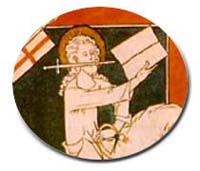 |
Forgotten Truths
Popes Justify the Death Penalty
We have received objections to our previous posting of St. Augustine and St. Thomas defending the death penalty. “To be in favor of capital punishment is against Catholic charity,” the objectors argued. “These Saints were just giving their personal opinions on the topic, so they do not reflect the official teaching of the Church. Therefore, they need not be followed,” they concluded.
Since we did not have the time to make a long research, we respond to these objections by presenting some texts of Popes justifying the death penalty. They follow below.
Innocent I
The first Pope to take a stand in favor of the death penalty was Innocent I in the year 405. In response to a query from the Bishop of Toulouse, Pope Innocent I based his position on Paul’s Letter to the Romans. He wrote:
It must be remembered that power was granted by God [to the magistrates], and to avenge crime by the sword was permitted. He who carries out this vengeance is God’s minister (Rm 13:1-4). Why should we condemn a practice that all hold to be permitted by God? We uphold, therefore, what has been observed until now, in order not to alter the discipline and so that we may not appear to act contrary to God’s authority.
(Innocent 1, Epist. 6, C. 3. 8, ad Exsuperium, Episcopum Tolosanum,
20 February 405, PL 20,495)
Innocent III
The secular power can without mortal sin carry out a sentence of death, provided it proceeds in imposing the penalty not from hatred but with judgment, not carelessly but with due solicitude.
(Innocent III, DS 795/425)
Pius XII
Even in the case of the death penalty the State does not dispose of the individual’s right to life. Rather public authority limits itself to depriving the offender of the good of life in expiation for his guilt, after he, through his crime, deprived himself of his own right to life.
(Pius XII, Address to the First International Congress of Histopathology
of the Nervous System, 14 September 1952, XIV, 328)
Catechism of the Council of Trent
The power of life and death is permitted to certain civil magistrates because theirs is the responsibility under law to punish the guilty and protect the innocent. Far from being guilty of breaking this commandment [Thy shall not kill], such an execution of justice is precisely an act of obedience to it. For the purpose of the law is to protect and foster human life. This purpose is fulfilled when the legitimate authority of the State is exercised by taking the guilty lives of those who have taken innocent lives.
In the Psalms we find a vindication of this right: “Morning by morning I will destroy all the wicked in the land, cutting off all evildoers from the city of the Lord” (Ps. 101:8).
(Roman Catechism of the Council of Trent, 1566, Part III, 5, n. 4)

Posted October 20, 2006


Related Topics of Interest
 St. Augustine and St. Thomas in Favor of the Death Penalty St. Augustine and St. Thomas in Favor of the Death Penalty
 The Common Good and the Criminal The Common Good and the Criminal
 Homosexual Priests Must Be Put to Death Homosexual Priests Must Be Put to Death
 The Popes Must Be Militant Guardians of the Flock The Popes Must Be Militant Guardians of the Flock
 Re-writing History to Serve the Gay Agenda Re-writing History to Serve the Gay Agenda
 One Sins by Not Becoming Duly Irate One Sins by Not Becoming Duly Irate
 The Immaculate Conception and True Combativeness The Immaculate Conception and True Combativeness
 Liberals, Modernists and Progressivists Liberals, Modernists and Progressivists

|
Forgotten Truths | Religious | Home | Books | CDs | Search | Contact Us | Donate

© 2002-
Tradition in Action, Inc. All Rights Reserved
|
 |
|